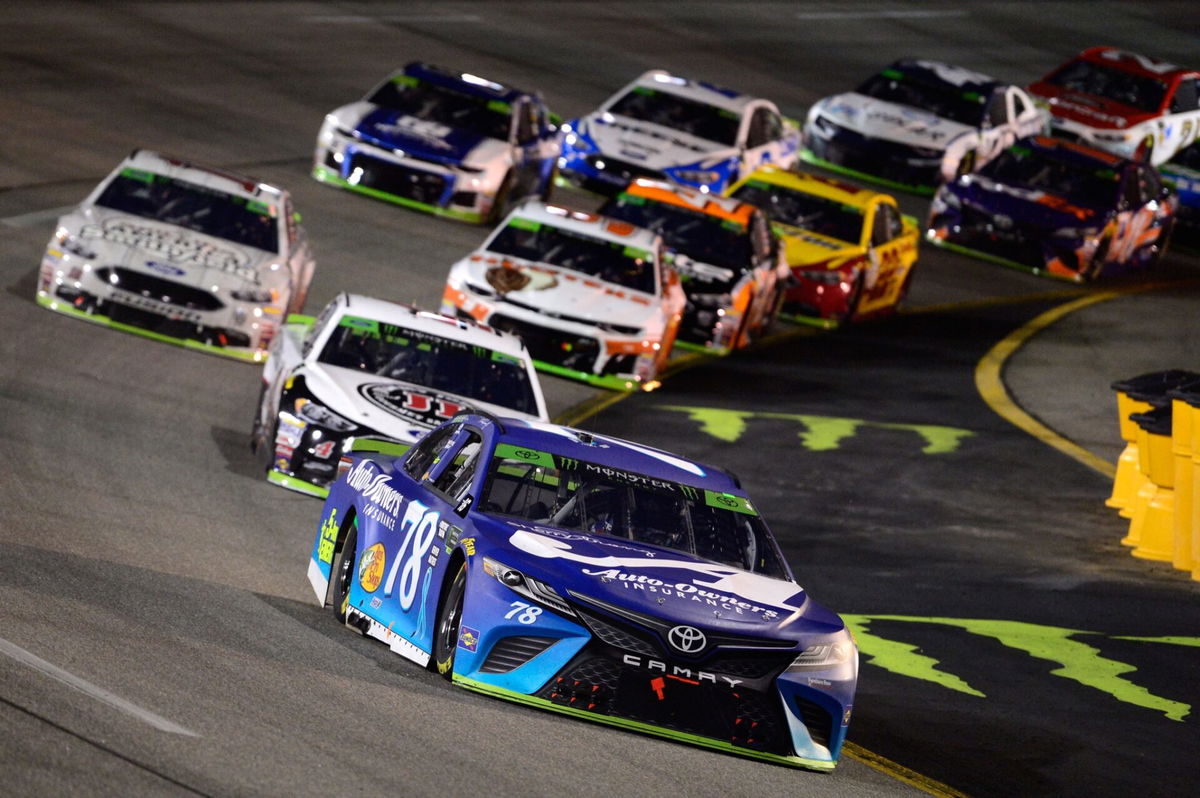
Getty
RICHMOND, VA – SEPTEMBER 22: Martin Truex, driver of the #78 Auto-Owners Insurance Toyota, leads a pack of cars during the Monster Energy NASCAR Cup Series Federated Auto Parts 400 at Richmond Raceway on September 22, 2018 in Richmond, Virginia. (Photo by Robert Laberge/Getty Images)

Getty
RICHMOND, VA – SEPTEMBER 22: Martin Truex, driver of the #78 Auto-Owners Insurance Toyota, leads a pack of cars during the Monster Energy NASCAR Cup Series Federated Auto Parts 400 at Richmond Raceway on September 22, 2018 in Richmond, Virginia. (Photo by Robert Laberge/Getty Images)

Getty
RICHMOND, VA – SEPTEMBER 22: Martin Truex, driver of the #78 Auto-Owners Insurance Toyota, leads a pack of cars during the Monster Energy NASCAR Cup Series Federated Auto Parts 400 at Richmond Raceway on September 22, 2018 in Richmond, Virginia. (Photo by Robert Laberge/Getty Images)

Getty
RICHMOND, VA – SEPTEMBER 22: Martin Truex, driver of the #78 Auto-Owners Insurance Toyota, leads a pack of cars during the Monster Energy NASCAR Cup Series Federated Auto Parts 400 at Richmond Raceway on September 22, 2018 in Richmond, Virginia. (Photo by Robert Laberge/Getty Images)
When you think of NASCAR’s golden eras, certain names instantly light up the memory bank – Richard Petty, Dale Earnhardt, Jeff Gordon, and others. These weren’t just race car drivers; they were larger-than-life figures who transcended the track and became cultural icons. Petty’s cowboy hat and aviators made him a legend before he even fired up the engine. Earnhardt’s black No. 3 became a symbol of intimidation and resilience. But why do we not see that same star power today?
Watch What’s Trending Now!
These drivers didn’t just win races; they carried the sport on their backs, shaping storylines that kept fans hooked. But fast forward to today, and we don’t see that crazy fan following anymore. The wins are there, the rivalries too, yet something seems missing. And that’s what has led insider Jeff Gluck to address this challenge, and the solution might lie with just a simple tweak to the NASCAR playoffs.
Jeff Gluck on why the current format doesn’t help build stars
The current NASCAR playoff format is facing growing criticism, primarily for how it impacts the sport’s star power. As Jeff Gluck explains, “What happens when one of the big-name drivers now wins? We say, oh, they won, they’re in, so we don’t need to talk about them anymore.” This dynamic shortens the spotlight on marquee drivers once they secure a playoff spot early, diminishing ongoing fan engagement with the biggest names.
Instead, attention shifts to lesser-known drivers battling elimination, diluting star-driven narratives essential for NASCAR’s popularity. This dissatisfaction has led to increasing discussions about major changes for the 2026 season, including the most drastic option — Ditching the playoff format altogether.
NASCAR insiders note a growing interest in moving toward a full-season points system resembling Formula 1 or other international motorsports, where drivers accumulate points continuously throughout the year without playoff resets or elimination rounds.
Gluck acknowledges this shift could come with short-term pain, “I think there might be lower ratings for a couple of years potentially, but what it would do is build long-term some investment back in creating the star power for the drivers because that is the number one problem in my opinion.”
View this post on Instagram
A season-long points battle will allow fans to follow consistent rivalries and storylines, solidifying driver identities over 36 races rather than focusing on playoff cutdowns. Formula 1 exemplifies how sustained competition and clear championship progression create global stars like Lewis Hamilton and Max Verstappen.
One thing’s for sure: the work is in progress about this, as NASCAR managing director of communications Mike Forde recently gave an update on the Hauler Talk podcast, “The next step is NASCAR is going to get its leadership in position and really have a discussion and lock ourselves in a room and figure it out from there.” Whatever happens, it’ll be implemented from 2026 onwards, as per him, as it shouldn’t devalue this year’s finale at Phoenix.
In summary, while NASCAR’s playoff system brought excitement and unpredictability since 2004, the trade-off in star power growth has fueled calls for change. Moving to a simpler, season-long format could rebuild meaningful fan connections around top drivers, ensuring NASCAR’s long-term health beyond short bursts of dramatic eliminations.
Steve Phelps admits NASCAR must do more
NASCAR president Steve Phelps isn’t sugarcoating things. He knows one of the sport’s biggest issues right now is star power. Or rather, the lack of it. As he put it bluntly, “The number one thing holding NASCAR back is the lack of star power.” Today’s drivers are insanely talented, but they’re not breaking through to fans the way legends like Richard Petty, Dale Earnhardt, and Jeff Gordon once did.
For Phelps, creating that magic isn’t just about racking up wins. It’s about turning drivers into larger-than-life heroes through storytelling, branding, and media exposure. That’s part of why NASCAR rolled out the driver ambassador program in 2025, giving drivers more tools to build their personal brands and putting them in front of fans in new ways. “It’s putting us in places where we’re not,” Phelps explained, adding that it’s already boosted driver-focused content and awareness.
He’s also quick to point out that drivers are already heroic by nature. They strap into 200-mph race cars every week, risking it all in the name of competition. But simply being brave isn’t enough to turn someone into a household name. True star power, Phelps says, requires journalists, broadcasters, and NASCAR itself to tell compelling stories, ones that make fans feel emotionally invested.
The consequences of not doing this are showing. Even with thrilling racing, TV ratings have flatlined, and fan engagement is softer than it used to be. Without strong personalities to rally around, the sport struggles to capture mainstream attention.
That’s why Phelps is pushing so hard for a renewed focus on the drivers. The idea is simple. Build heroes, create connections, and give fans someone to truly root for. If NASCAR can do that, he believes the sport can reignite the kind of passion that once made it a cultural phenomenon.



